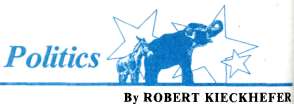 |
Home | Search | Browse | About IPO | Staff | Links |
 |
Home | Search | Browse | About IPO | Staff | Links |
 Blind primaries: a brick on a top-heavy load?IT'S AMAZING, isn't it, how the principles of good government can be bent when something really important is at stake -- something like political expediency, for example. Take, for instance, the new "blind primary" being foisted on the electorate by the Illinois Republican party. The blind primary, approved by the Illiinois legislature during the spring session, was formally adopted by the GOP State Central Committee early in August. It prohibits candidates for delegate to the 1980 Republican National Convention from listing on the ballot the name of the presidential candidate they prefer. In other words, under the old practice you would see on the ballot: Under the new system, you would find on the ballot: Informative, isn't it? And why, you ask, did the Grand Old Party decide to do this wonderful thing? Well, there are two versions of the answer to that question -- the official version and the cynical version. Illinois GOP Chairman Don Adams presents the official version. He says the party got wind of a plot by some people to run using U.S. Rep. Phil Crane's name even though they didn't really plan to vote for Crane at the convention. So, to take his argument to its furthest reaches, the party decided that the way to prevent some delegate candidates from misleading voters in their district was to leave voters everywhere totally in the dark. Adams also points out, quite correctly, that there is no way delegates can be bound legally to vote for the candidate they list on the ballot; that Illiinois' primary is so early that delegates might change their minds between the time of their election and the time of the convention; and that the primary also includes a "beauty contest" where voters can indicate their preference for a presidential candidate directly. However, the fact remains that delegates -- not "beauty contest" results --will cast votes in Detroit in 1980. And those delegates are going to be elected almost totally without reference to their choice of a candidate. The cynics' answer to the question is that Gov. James R. Thompson and former Texas Gov. John Connally have struck a deal. The deal, the story has it, is that Thompson will use the blind primary rule to gain tight control of the Illinois delegation, then deliver the state's 102 votes for Connally. Dare one whisper that the nominee for president remembers recent favors when selecting his vice presidential candidate? Suspicion grows like weeds in spring when one remembers that Thompson aides lobbied for passage of the blind primary bill in the closing days of the General Assembly's spring session. Thompson and Connally have both denied reports of such a deal. But it is easy enough to see how the arrangement could work. Since most of the voters will have no idea which delegate candidates are pledged to which presidential candidates, the most likely winners for delegate will be those with well-known names -- state lawmakers and local officials. By a strange coincidence, most of them are loyal party people who will toe the line on something like orders on how to vote. Thompson says it just isn't so. Connally, at a forum for presidential candidates in Rosemont recently, had an interesting angle on the subject. "By next March," he said, "I'd hope to be the frontrunner and have proven to the country I can do the job. By that time, I might want my name on the ballot." Others who appeared at the forum were less than enthusiastic about their party's decision. "Now, I'm very disturbed by this," said U.S. Rep. John B. Anderson, himself a candidate for the GOP presidential nomination. "This will be just one more brick on a top-heavy load on people who think politicians decide the presidency rather than the people." State Committeewoman Margaret Hart, who voted against the change, said she feels it will work against the GOP goal of broadening party support. "I do not think it will attract people to the polls to vote for a candidate they don't know or don't know who they support," she said. If Thompson is looking for a vice presidential nod in return for backing Connally with a united delegation, he might pause for a minute and consider some words of wisdom from an old political pro, Harold Stassen, who also was at the Rosemont forum. "The standard tactic," Stassen said, "is that any of the leading candidates have anywhere from seven to 10 governors and senators feeling they'll be the one." Wouldn't it be a shame for Thompson to blind the Illinois voters -- then not get the nomination anyway? September 1979 / Illinois Issues / 34 |
|
|